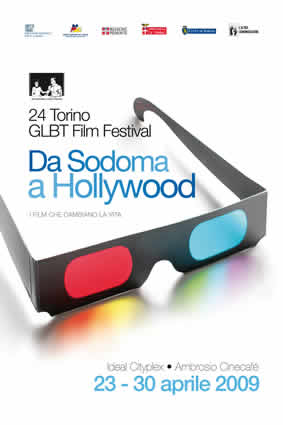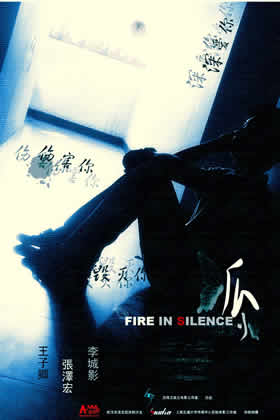 Nearly a quarter century, 24 years of exploration and construction of queer imaginary. With a discerning eye and thanks to a sharp and sensible look, year after year the Festival has grown into one of the most significant occasions promoting a frank dialogue between the GLBT community and the general public. The Festival has presented various Italian premieres and has marked the debut of significant film authors such as François Ozon, Gus Van Sant, Derek Jarman, Todd Haynes, Eytan Fox, Apichatpong Weerasethakul, Alain Guiraudie, Auraeus Solito, Christophe Honoré and Brillante Mendoza.
Nearly a quarter century, 24 years of exploration and construction of queer imaginary. With a discerning eye and thanks to a sharp and sensible look, year after year the Festival has grown into one of the most significant occasions promoting a frank dialogue between the GLBT community and the general public. The Festival has presented various Italian premieres and has marked the debut of significant film authors such as François Ozon, Gus Van Sant, Derek Jarman, Todd Haynes, Eytan Fox, Apichatpong Weerasethakul, Alain Guiraudie, Auraeus Solito, Christophe Honoré and Brillante Mendoza.
FESTIVAL SECTIONS
International Competitions
Three competitive sections with three international juries:
Feature film competition: – Ottavio Mai Award (5000 Euros)
Documentary competition – (2500 Euros)
Short film competition – (1500 Euros)
An audience prize will be awarded to the best film of each section.
One of the members of the International jury will be Harry Baer, German actor known especially as a member of the artistic group collaborating with R.W. Fassbinder right from the first film Katzelmacher in 1969, and working soon after also behind the camera (especially in Berlin Alexanderplatz, Lili Marlène and the last magnificent Querelle).
Nuovi Sguardi Award
Assigned by the Festival selection committee, the award will be given to either a feature film or a documentary reflecting the evolution of Queer Cinema for its capability to navigate and combine diverse visual languages and to incorporate identity issues within various different film genres.
Out of Competition and Panorama
The Out of Competition section features premieres by internationally acclaimed directors or some titles to be released in Italy soon.
Three non-competitive sections for feature films, shorts and documentaries will offer an exhaustive “panorama” of the latest and most stimulating developments in GLBT film and video productions.
Among the titles shown at the festival: Nés en 68 by Olivier Ducastel and Jacques Martineau (two generations face each other: the one who fought in 1968 and the one born in 1968) and Another Gay Sequel: Gays Gone Wild by Todd Stephens, the follow up to Another Gay Movie, with new crazy sexy adventures of the four protagonists.
Retrospective – Giuseppe Patroni Griffi
Giuseppe Patroni Griffi was an Italian film and theatre director, whose cinema and theatre works turned around transgression, where homosexuality often has plaid an important role. His characters have always shocked with a sensual and free-libertine vision of the world, destined to subvert social taboos linked to sexuality. Included in the retrospective: his debut in 1962 with The Sea and Love Circle (1969), adapted from a theatre pièce, starring Florinda Bolkan and Jean-Louis Trintignant, which was cut by the censors, but also became a great box office success.
Voice Over 4
The art world in the ’80s of the Canadian artistic group “General Idea” and of Keith Haring; the contemporary world of German photographer Wolfgang Tillmans; lesbian pioneer filmmaker Barbara Hammer’s latest two movies; Pascal Robitaille’s latest low-budget project L’Apesanteur, and many other videos, documentaries and movies are shown in the section of the festival, where cinema gets contaminated with the other arts and gives birth to as many different languages as the various shades of the eye are.
L’Apesanteur, and many other videos, documentaries and movies are shown in the section of the festival, where cinema gets contaminated with the other arts and gives birth to as many different languages as the various shades of the eye are.
Europa Mon Amour
“Muscles in Skirts: The Italian Peplums”
Following on a line of research that started two years ago with the “Spaghetti Western” movies, the Festival will focus on the so-called “Peplum movies”. Hugely popular at the time, the Italian cinema in the fifties and sixties produced an endless series of B-movies on historic themes. Muscle men, wearing short skirts and brandishing their shining short swords, whose acting was more a pretext to show off male nudity like some American magazines such as Beefcake did for bodybuilders. Among the titles: Vittorio Cottafavi’s Hercules’ Revenge (1960), Sergio Leone’s The Colossus of Rhodes (1961) and Sergio Corbucci’s The Son of Spartacus (1962).
Music & Movie Icons
UK 1979-2009. From “Ashes to Ashes” to the “Common People” Generation
30 years in music to celebrate the Queer Revolution Made in UK: from David Bowie’s transgression to the new-romantic transformism of Visage; from the planetary success of the Smiths to the radio hit of Smalltown Boy, from the consacration to fame of Soft Cell and Pet Shop Boys, up through the ’90s with the Brit-Pop era and its Common People, the song by Pulp against the excesses of the ’80s, as well as an elegy to normal life seen as diversity.
Nowadays to follow this evolution, there are bands like Franz Ferdinand and The Rakes, in whose music whatever remaining taboos are sung with wit and irony.
THE EVENTS:
Carte Blanche to Ferzan Ozpetek
The director of The Ignorant Fairies (2001), Saturn in Opposition (2006) and A Perfect Day (2008) is invited to introduce the Festival audiences to the “films of his life”. This selection includes such classics as Michael Powell and Emeric Pressburger’s Black Narcissus (1947), Morton DaCosta’s Auntie Mame (1958) and Vittorio Caprioli’s Lions Lying in the Sun (1961).
Three Special Awards: Ventura Pons, Monika Treut and John Greyson
The 2009 Festival Special Award will be given to Catalan filmmaker Ventura Pons, presenting his new movie Strangers (2008). One of the pioneers of gay cinema, Pons has made over twenty feature films, some of which, Caresses (1988), Beloved/Friend (1999), Food of Love (2002) and Barcelona, A Map (2007) have been distributed in Italy.
Diverse reactions were received after the screening of Ghosted by Monika Treut at the 2009 Berlinale. Treut, German director in the industry from the early ‘70s (with Elfi Mikesch as director of photography), is capable of redrawing the map of female characters.
John Greyson is the Canadian director of Fig Trees (Teddy Award winner for best documentary at the 2009 Berlinale). He is mainly known for his strong activism to fight Aids: Fig Trees is indeed a documentary on pharmaceutical companies producing drugs to fight the terrible virus.
20 Years from the Fall of the Berlin Wall
Two movies that remember the life in the divided city: Wieland Speck’s Westler (1985) and Heiner Carow’s Coming Out (1989. There will be also Marco Wilms’ Comrade Couture, a unique portrait of the strange and hidden “fashion” life in the further socialist part of Germany.
This event is part of the Biennale of Democracy that will take place in Turin, April 22-26.
Stonewall: from Judy Garland to Harvey Milk
Judy Garland made her final film appearance in Ronald Neame’s I Could Go on Singing (1963). This is the last movie in which the beloved gay icon of that the time played in. Judy Garland died on June 22nd, just a couple of days before the violent New York riots engaging the GLBT community and the police broke out at the Stonewall Inn, in the Greenwich Village. A few years later, the gay activist Harvey Milk will start his battle for the civil rights with his “Hope” speech given in San Francisco. The Festival will present the extraordinary Oscar winning documentary made by Rob Epstein in 1984: The Times of Harvey Milk.
TRIBUTES
Filippo Timi: “Worse than being famous”
A unique personality of Italian cinema, theater and literature, Filippo Timi is the actor in the most recent movies of Gabriele Salvatores (As God Commands) and Marco Bellocchio (Vincere). He will introduce some of his most memorable characters: Count Masoch in L’eredità di Caino (Cain’s Inheritance) by Luca Acito and Sebastiano (a voyage in the human labyrinths of perversion and purity, inspired to the character of Leopold von Sacher-Masoch, a film in which Timi left a deep sign on the general vision of the movie); Zanna in Saverio Costanzo’s second feature In Memory of Myself (the rebellious novitiate who open the eyes of another young novitiate about the strange world of the Church) and the partisan facing struggle and freedom in the multi awarded Homo Homini Lupus by Mattia Rovere.
Ardorfo Arrieta: Love Delirium
A Spanish author close to the French Nouvelle Vague, Arrieta is a painter and a great connoisseur of Jean Cocteau’s works. His short movies shot in Madrid in the ’60s are milestones of the indipendent cinema, while Les Intrigues de Sylvia Couski, shot in Paris in 1974, is considered the first Parisien underground militant work.
Guy Gilles: Time Out of Time
Guy Gilles was born in Algiers in 1938 and moved to France at the end of the ’50s. Here he directed his first feature film, Love at Sea (1962) starring Juliette Gréco, Romy Schneider and Jean Pierre Léaud, as well as Patrick Jouané, who would become his alter-ego on screen as well as his partner in life. Marguerite Duras loved very much his second feature Wall Engravings (1968) and Jeanne Moreau supported him in the making of Repeated Absences (1972): the most autobiographical movie of this eclectic filmmaker, who worked in between cinema, painting, writing and photography.
Dorothy Porter: Rhymes of Cinema
Tributed to Australian poetess Dorothy Porter, who recently passed away, this Festival section presents her work done for cinema: Julian Temple’s The Eternity Man (2008) and Samantha Lang’s The Monkeys’ Mask (2000): a lesbian noir, originally written as a novel in rhymes and later adapted to be a movie.
She Lea Cheang: Radical&sex;&punk;
Multi-media-artist, born in Taiwan, lives in Paris. Working within the fields of netbased installations, videoart and film making, Shu Lea Cheang is dealing with multidisciplinary aspects and studies, paying attention to the connections between media languages and real world, exploring “ethnic stereotypes, the nature and excesses of popular media, institutional – and especially governmental – power, race relations, and sexual politics” (Cheang). The Festival presents two long feature films Fresh Kill (1994) and I.K.U. (2000), and some of her shorts made between 1995 and 2008.
Lesbian Series: “Sugar Rush” and “Society” – UK vs South Africa
Sugar Rush is one of the most popular and loved GLBT TV series. Broadcasted on Channel Four in the UK, this series has raised much heated controversy and many criticism for dealing with the touchy subject of teenage homosexuality: leading character Kim is only 15 years old. Never seen on any Italian TV channel, Sugar Rush has become a cult show within the Italian lesbian community who watches it over the internet. The Festival attention to the teenager world in cinema will now contaminate with the so-called “New Media World”.
The real world of young black women is the main plot for Society: a South African series showing freedom after the introduction of the Civil Union Acts and the non-discrimination on sexual bases of the constitution issued by Nelson Mandela.
